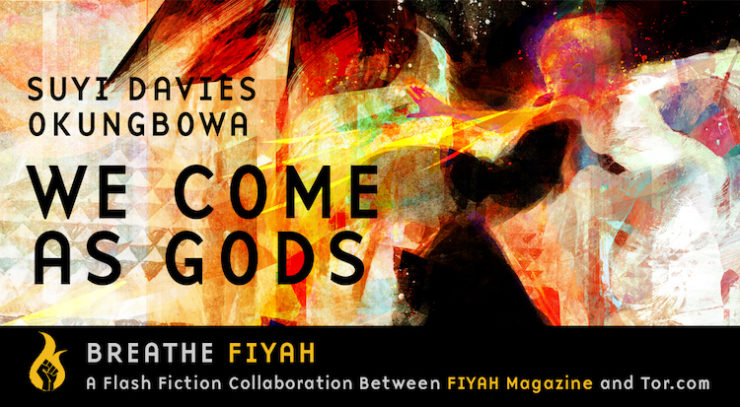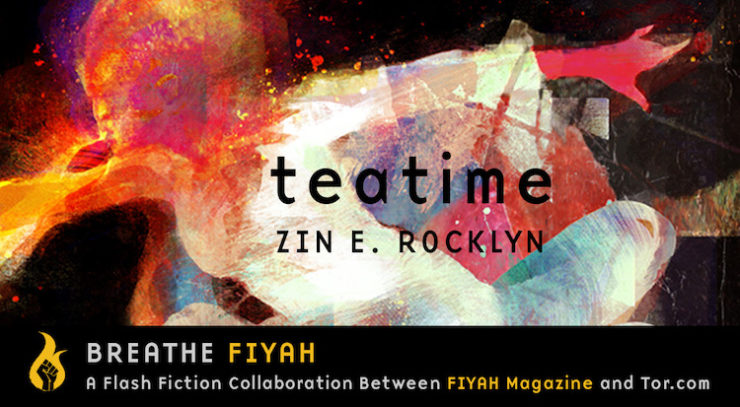In honor of Black Speculative Fiction Month, eight SFF authors share stories that honor forebearers and memories of the past, fight the legacies that underpin the brutalities of the present, and demand a future that’s freer than today.
The stories publish on Tor.com all throughout the morning of October 19. They are collected here.
First, we come as servants. Who we were before this is not important: not the wars we may have fought in or ran from; not the academies we may have attended or not; not if we were once master or slave. All that matters, in the beginning, is that we are a people’s people, that we may stand in the midst of a crowd and be indistinguishable. On our heads lie the same hair as theirs, and on our feet the same sandals. We are simply one and the same, isn’t it obvious?
Next, we come as heroes. Shining armour, arms unafraid to swing, tools of mass destruction that fit in the palm of our hands. We invoke the gods of our people, and they descend and stand beside us. The people see their hands outstretched upon our shoulders, their eyes shut in blessing. Godly garments turned inside out so that all of the bloodstains they bear, vestiges of their pasts—we can smell the red wetness of them, this close—may stain their skins, but the fore of their garments, that which is in view of the people, glisten white. That is not for us to judge—these bloodstains were earned in battles like this, after all, long, long ago. Too long, faded from common memory. Of what use is such old knowledge to today’s people? Let them worry about today’s problems. So we keep the eyes of those before us from straying too far, keep them on today’s prize. For our freedoms! we scream, and we strike down mercilessly, bolstered by the bloodthirsty cheers of our kin.
Then, we come as saviours. People line up in the streets to cheer our victory. They bear our names and battle cries on their banners, on their tunics, on their hats, in their hearts. They radiate a hope not long witnessed in this land. There are more hopes, too, clung to by others, but those are distractions. Some hopes are more important than others. We let the songs of praise wash over us, drown out any voices of discord. Today is a day of victory, and there will be room for nothing but that.
Afterwards, we come as merchants. The people need a firm hand to represent their interests, to protect them from alien forces of disrepute. We rip what we can from the land for collective gain, but first, we must shell it out to whoever will fork out the most. We must do this to satiate the endless pits. No, not of our bellies—there are no pits in our bellies; who would think such?—but in the hearts of those we serve. Pits so endless they have become an abyss. But no matter. There will always be something to be sold, something to feed back into that abyss. There will also be enemies, within and without, who remain unsatisfied with this good work, but again—no matter. We shall hunt them down and remand them. They shall rot alive until they call out to their gods. Our gods. And yes, they do answer, our gods, and they descend again—not with outstretched hands of blessing this time, but with questions we cannot answer. We tell them just so, and they understand because they, too, did not have answers in their time. So they leave us be, and we continue to fight for the people. We decree laws. We impound, incarcerate, protect. Their cries are hysterical, but we silence them with the good solutions we know are best. We keep our people safe and secure. We keep our people. We keep.
In time, we come as ghosts. In the moments after we bite off the final poisoned apple—that which banishes us to a life outside of this one—we are besieged by Death’s messenger. He comes to our door in our moment of failing and stands there, staff in hand. Silent, watching. We go berserk, call for our household, tell them, Can you not see? But they hold up their hands, say, Are you going to leave us like this? They blame us for our sickness, yet in the same breath, inquire about where we have placed our bounties. So, it is with relief that our bodies surrender, that we escape the sting of tears and anger cast our way. Only Death’s messenger remains to taunt us as we exit, saying: You and I are the same. We are the harbingers of something that ends all in its path, yet we may not always deal the striking hand. He never leaves, Death’s messenger, even after we do, lingering on for the next, and the next, and the next.
In our final days, we come as gods, just like those who once stood beside us. They invoke us now, the people, praying us to bless their new hero preparing for battle. Now we stand beside this hero, our arms outstretched, garments inside out so that the white is clear, and the bloodstains from our conquests remain invisible. The red wetness presses our garments to our bodies, causing an itch we cannot scratch and a smell we cannot escape. But no matter. The people sing our names anyway. They want this hero, just like they once wanted us. Soon after, they will want another again. So long as they live and we exist, they will always want another.
And so we oblige. We stretch out our hands and bless.
“We Come as Gods” copyright © 2020 by Suyi Davies Okungbowa
Art copyright © 2020 by Eli Minaya
Suyi Davies Okungbowa is the author of Son of the Storm (Orbit, May 2021), first in The Nameless Republic epic fantasy trilogy, and the godpunk novel, David Mogo, Godhunter (Abaddon, 2019). His shorter works have appeared internationally in periodicals like Tor.com, Lightspeed, Nightmare, Strange Horizons, Fireside, and anthologies like Year’s Best Science Fiction and Fantasy, A World of Horror and People of Color Destroy Science Fiction. He lives between Lagos, Nigeria and Tucson, Arizona where he teaches writing at the University of Arizona and completes his MFA. He tweets at @IAmSuyiDavies and is @suyidavies on Instagram. Learn more at suyidavies.com.














